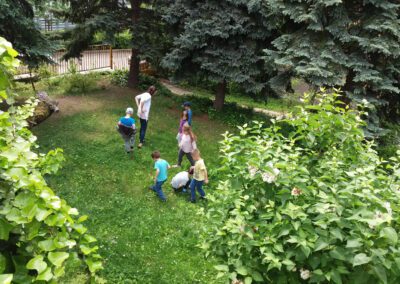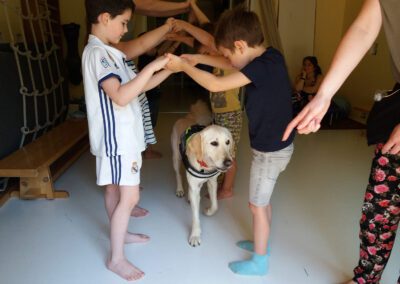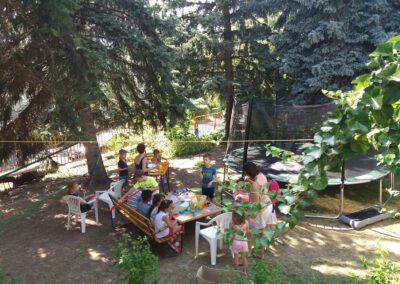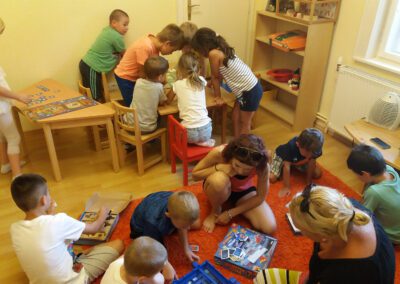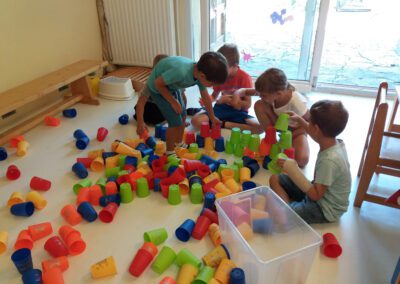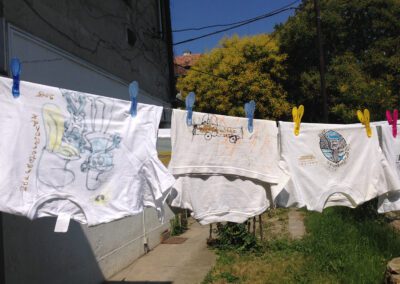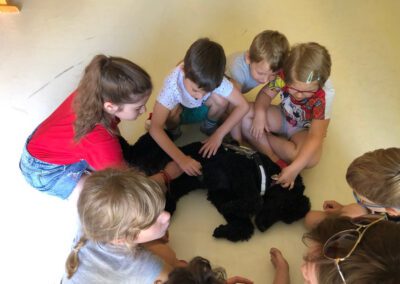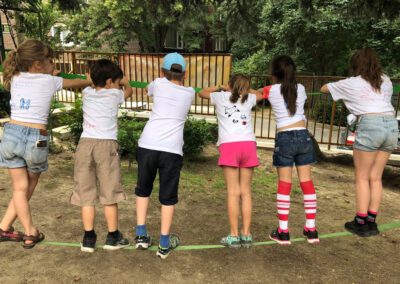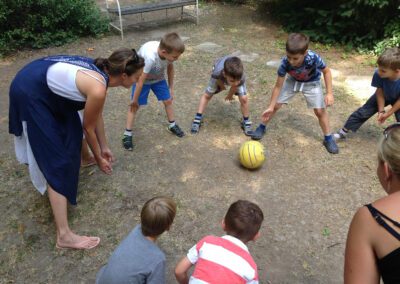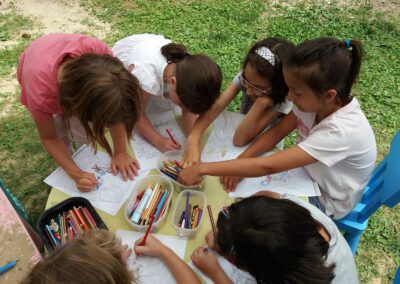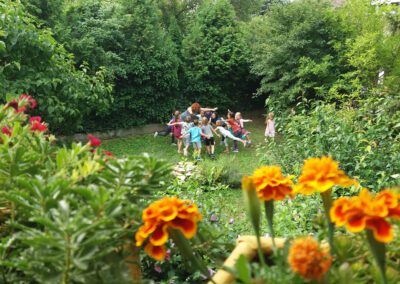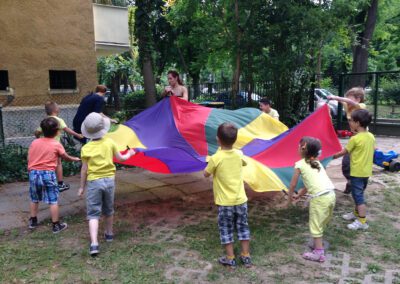About us
Napraforgóház development and therapy centre has been operating since 2003 in the II. district of Budapest. As a result, the centre now provides
– complex assessments and evaluations
– trainings
– therapies
for children between the ages 0 and 12 – some services up to 18. We belive that success of complex therapy is based on a supportive family environment and we therefore accomodate counselling for parents and families. Evaluation, therapy and consultation with parents are in English ![]() .
.
We perform assessments based on the concerns and problems raised by the parents, the kindergarten, the school, the paediatrician pr the health visitor. The complexity, density and the context of the assessment is decided on, after consulting with the parents. The results and outcome of the assessment, as well as the recommended therapy, is discussed in person with the parents. A written report can be provided upon request. If deemed necessary, the assessment result can also be discussed with the child’s teacher or therapist.
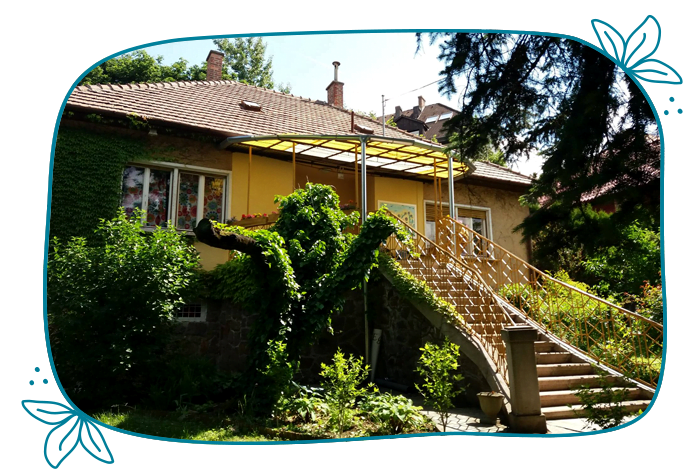
How to apply for assessment and therapy?
1. STEP
Anamnesis
Please complete the anamnesis form on our website and send it to us. To facilitate the application, please attach an evaluation of the child’s previous assessment, a preschool/school report.
If there is a survey assessment more than 6 months old, we will review it and if no new assessment is needed, we will schedule a first appointment.
napraforgohaz@napraforgohaz.hu
2. STEP
Contact
We will contact you by e-mail or phone within 2-5 days of receiving your medical history form.
You can find out about the types of survey, their content and fees in the „Prices” section, but we will also suggest what kind of survey we would consider important based on the material you send us.
3. STEP
Appointment
We will make an appointment for an assessment.
Most frequent challenges and difficulties you can contact us with
delayed motor skill development
delayed cognitive development
sensory processing disorder
developmental disorders (intellectual disability, autism spectrum disorder...)
attention and concentration challenges (ADHD, ADD)
delayed speech and language development
developmental coordination disorder
learning difficulties
poor fine motor skills
behavioural difficulties
2024 summer camps of Napraforgóház
Our camps are recommended for children aged 4-8 years.
The camp is open from 8:00 am to 4:00 pm.
8:00 – 9:00 Arrival, free play
9:00 – 9:15 Breakfast/breakfast
9:15 – 9:30 Talk, warm-up games
9:30 – 11:30 Activities according to the theme of the camp
11:30 –13:00 Games and lunch
13:00 – 14:00 Games, storytime, sleep (on request)
14:00 – 15:30 Craft
15:30 – 16:00 Snack, games, going home
Please bring a small bag with the following items for your child to leave during the week:
– change of clothes (underwear, socks, t-shirt, pants, sweatshirt);
– sunscreen if the sunscreen we use is not suitable for your child;
– tick spray if the organic tick spray we use is not suitable;
– sunscreen hat;
– outdoor and indoor easy-off shoes, sandals.
Meals:
Lunch and snacks from the abundant and fresh food we have put together.
Lunch is made to order. In the case of food allergies, we usually order from Dr. Sef, but this will be discussed with the parent.
We take care of the children’s fluid intake, they are given non-carbonated syrups, but mainly water.
Sign-up
E-mail:
napraforgohaz@napraforgohaz.hu
Telephone:
+36-70/977-2588
Location
35, Hankóczy Jenő u. II. District
To apply, you must send us the following documents:
Classes are taught by qualified teachers.
During the camp, you can reach us at the following number:
+36-70/977-2588
CHILDREN ARE WELCOME!
Meet our staff
Beáta Szabó
Conductor
Ayres/DSZIT therapist
AIT/FST therapist
Head of the Napraforgóház
Judit Blazejovsky
TSMT therapist
Nursery teacher
Boglárka Bűdi
Speech and language therapist
Behavioral specialist/Autism expert
Prompt therapist
Beáta Silling
Conductor
Tímea Bata
Therapist
Prices
Price of assesments |
|
| Assessment of general development and sensory-motor skills |
40.000 Ft / 60 min |
| Speech and language assessment |
40.000 Ft / 60 min |
| Communication and social skill assessment |
40.000 Ft / 60 min |
| Parental consultation after assessments | 20.000 Ft |
| Written report | 20.000 Ft |
Group therapiesPrice of therapies |
|
| Sensory motor skill therapies:
Ayres/DSZIT, TSMT |
8.000 Ft
/ 45 min |
| Sensory motor skill therapies:
Ayres/DSZIT, TSMT |
9.000 Ft
/ 60 min |
| Parental consultation | 20.000 Ft
/ 45 min |
Individual therapiesPrice of therapies |
|
| Sensory motor skill therapies:
Ayres/DSZIT, TSMT, Pfaffenrot, Physiotherapy, Conductive education |
13.000 Ft
/ 45 min |
| Sensory motor skill therapies:
Ayres/DSZIT, TSMT, Pfaffenrot, Physiotherapy, Conductive education |
15.000 Ft
/ 60 min |
| Communication and social skill training | 13.000 Ft
/ 45 min |
| AIT/FST home training | 80.000 Ft
/ 10 day training |
Location
At Pasarét:
1022 Budapest, Hankóczy Jenő street 35.
At Budafok:
1221 Budapest, Vihar street 22.
Contact
Phone:
+36-70/977-2588
E-mail:
napraforgohaz@napraforgohaz.hu
Data protection information
Other datas
Company name:
Napraforgóház Fejlesztő és Játszó Csoport Bt.
Company registration number:
01-06-719757
Company tax number:
20217466-1-43

